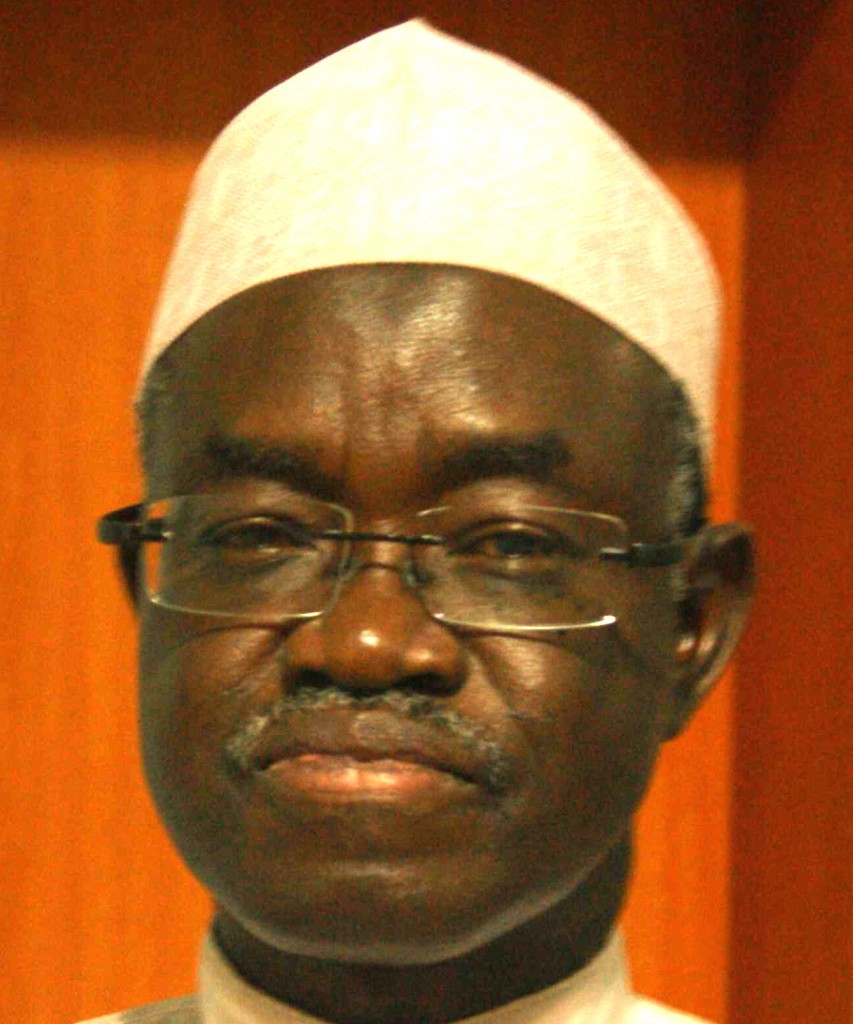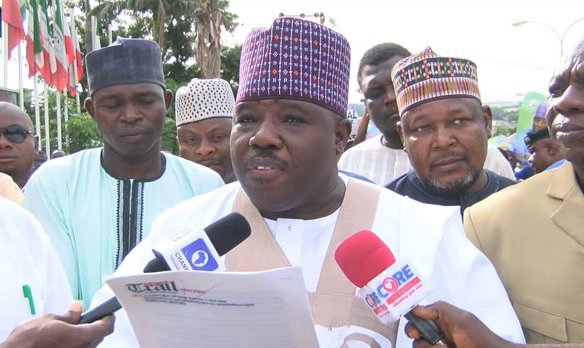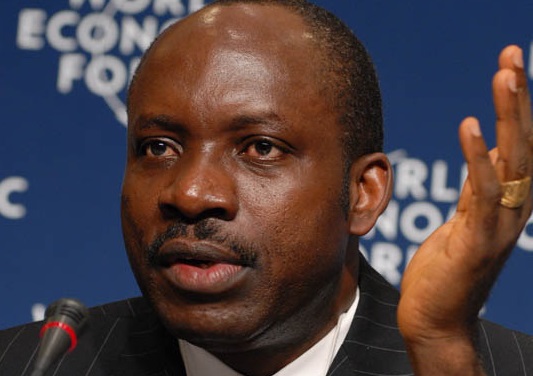Last weekend former Vice-President, Atiku Abubakar, returned to what seems to have become his hobbyhorse of late: restructuring Nigeria. The occasion was a memorial conference on July 30 to mark the death of Northern Region’s first and only military Governor, Major-General Hassan Usman Katsina 21 years ago on July 24. The former vice-president spoke on “The challenges of national integration and survival of democracy in Nigeria”.
The only guarantee for national integration and survival of democracy in Nigeria, he said in his speech, is the restructuring of the country. In any case, he said, it was inevitable. The North, he said, should therefore stop what he called its “knee-jerk resistance” to the calls.
“I suggest,” he said, “we resolve today to support calls for the restructuring of the Nigerian federation in order to strengthen its unity and stabilize its democracy. I believe that restructuring will eventually happen whether we like or support it or not. The question is whether it will happen around a conference table…or will it happen in a more unpredictable arena and in a manner over which we have little influence. It should be at a table and we need to be at that table.”
The day before Atiku Abubakar spoke, i.e. July 29, the inimitable Pastor Tunde Bakare, the General Overseer of Latter Rain Assembly and General Muhammadu Buhari’s running mate in the 2011 presidential elections, had spoken with perhaps even more impassioned voice on the same subject.
Advertisement
The occasion this time was the 50th anniversary of the assassination of the first Western Region’s military governor, Lt-Col Adekunle Fajuyi, in the revenge coup of July 29, 1966. Fajuyi was killed, along with Major-General JTU Aguiyi-Ironsi, his guest as Head of State, when Ibadan, the regional capital, was supposed to be hosting a conference of the country’s traditional rulers.
The conference was meant to douse the tension that had pervaded the country following the first coup on January 15 in which nearly all senior Northern military officers, along with the region’s premier, Sir Ahmadu Bello, and the country’s Prime Minister, Sir Abubakar Tafawa Balewa, were assassinated.
Speaking in a vein similar to Abubakar’s, Bakare said that restructuring was in the interest of all sections of the country, including the North which seemed opposed to it. “Need we,” he said, “remind those in opposition to restructuring today that one of the main grouses of Nigerians of northern extraction within the army and civil society after the first coup was the abrogation of the federal system by the Aguiyi-Ironsi led government?”
Advertisement
The call for restructuring, the pastor said, was a demand for a return to the First Republic’s regionalism which was “a demand for the prosperity of the constituent parts that make up the whole…It is therefore inconsistent with the interest of the North or the South for the current pseudo-federal structure to persist.”
In broadening his appeal for restructuring to include the already apparently converted Southern elite, Bakare did not scold any one. Even then it is safe to suspect that in speaking thus he had Vice-President Osinbajo in mind for supposedly becoming a latter day convert against restructuring.
However, if the pastor was content to use innuendo to chide Osinbajo, it was not so with quite a number of fervent restructuring crusaders, notably Afenifere, the Yoruba umbrella socio-political organization, Lt-General Alani Akinrinade, a former highly regarded defence chief, and Chief Chukwuemeka Ezeife, former old Anambra State executive governor.
Speaking on behalf of Afenifere, Mr. Yinka Odumakin, its National Publicity Secretary, said his organization took serious offence with Osinbajo’s “new” position. “The Vice-President,” Odumakin said, “may have come under pressure to lend his voice to the upholders of the status quo that has brought Nigeria to this sorry pass,” but by so doing and by reducing restructuring to the issue of more revenues for states, the vice-president committed a “faux pas”. (Punch, July 12).
Advertisement
“The central plank of restructuring,” the Afenifere spokesman said, “was for Nigeria to go back to true practice of federalism wherein, mineral resources that abound in all states would be freed from the exclusive list so that states would move into prosperity.”
On his part, Ezeife said he didn’t want to believe Osinbajo was reported correctly on the issue, but if he was, the vice-president was wrong. “Does he want to join President (Muhammadu) Buhari against the whole country,” he asked. Restructuring, he said, “was what will keep us together in view of the prevailing economic challenges. It will reduce the cost of governance. It makes our diversity to be positive. It is either we return to the six (three) regional structures or 12 regional units.” (Punch, July 12).
Of the three I have mentioned who have expressed displeasure with Osinbajo, General Akinrinade seemed the angriest. In a lengthy interview with Sunday Sun (July 24), he said procrastination over talking about their differences was what has led Sudan into its present horrible predicament.
“Because we Africans are stupid,” he said, “Sudan didn’t do it the way Czechoslovakia did it in the past. They are still killing one another now. It is as a result of leaving all these problems for too long.” The same fate awaits us, he argued, if we refuse to restructure.
Advertisement
The ruling party, he said, was in any case being unfaithful to its promise to restructure the country. “In the past two weeks,” he said, “we have heard, though people are trying to retrace their steps, the Presidency saying there is nothing like restructuring. Then, we heard the Vice President (Yemi Osinbajo) saying ‘no, what we need is good governance and not restructuring’. After that, we heard their National Chairman, John Odigie-Oyegun, saying another thing. Do they think we are idiots?”
The last national conference, he said, may not have answered all the questions about Nigeria but what he expected of the government was to pick up from where the conference left off rather than simply reject it.
Advertisement
“I think people will accept (this). But to tell us there is no restructuring, we are not going to take it. Nigeria is going nowhere without restructuring,” he said, with an apparent air of finality.
The problem with all those now condemning Osinbajo as a turncoat, directly or otherwise, is that the man never said he was against restructuring.
Advertisement
There are at least four basic elements to restructuring, aka “true federalism”: so-called resource control, state police, neo-regionalism and local government creation. Nowhere in the man’s interview did he say he was against any of these. On the contrary he spoke explicitly in support of resource control and state police.
“I have,” he says, “always been a strong believer in fiscal federalism that is to say, that the states must have more resources and we went to the Supreme Court. I actually went to the Supreme Court as Attorney-General of Lagos State no less than ten times on issues of fiscal federalism.”
Advertisement
Likewise on state police he couldn’t have been more explicit. “I strongly believe that we must have state police,” he said.
On the third element, what he was against, he said, was not restructuring Nigeria as such, but going back to the old regions or doing so along ethnic lines. As for the fourth element, it did not even feature in the interview.
“Dividing Nigeria, going back to regions and all of those kinds of things,” he said of the third element, “I do not believe that at all. I don’t think that we need to go back to regions. (And) if there are people who believe that we must structure ourselves again along ethnic lines I don’t accept that that is the right way to go.”
Afenifere says the issue of fiscal federalism is not just the states getting more revenues than they now do but taking 100% control of their resources. This is as gross a misrepresentation of the First Republic Constitution they say we must return to, as it is hypocritical.
Gross misrepresentation, because according to Section 134 of our Independence Constitution, collecting rents and royalties of all minerals, including oil, were exclusively federal. The only thing – and admittedly it is a big thing – was that the federal government was obliged to remit 50% of the rent and royalties to the states the minerals were derived from.
Therefore a valid argument can be made for an increase from the current 13% derivation for oil. And this does not require any constitutional amendment since 13% is only the floor set by the constitution, not the ceiling.
Afenifere’s position of 100% resource control – and for that matter all other similar ones – is also hypocritical because, national conference after national conference since 1978, they have always ran with the hare in broad daylight only to hunt with the hounds in the night; the fact is that if the alliance of the South-West, South-East, North-Central and the South-South led by the South-West that had always clamoured for resource control was sincere with itself, it would have defeated any and all opposition to their demand. The fact, however, is that each time the chips fell, all the non-oil oil producing states never supported even 50% derivation for oil, never mind 100%.
As for neo-regionalism and ethnicity based federalism, the one is as impractical (the demands for more states, as opposed to the collapse of the current 36 into six regions, have never abated) as the other is retrogressive (no country in the world has ever worked, not to say prospered, on the basis of ethnicity).
No, Nigeria’s central problem, one would never tire of repeating, is not its structure. Its central problem is its selfish and rapacious leadership.
It’s difficult, if not impossible, to put this any better than the rhetorical question Osinbajo asked in the interview for which he has since drawn so much flak: “Corruption for example, which is crippling Nigeria, is corruption a geo-political problem?”
Views expressed by contributors are strictly personal and not of TheCable.
3 comments








FG should consider the call made by the former Vice president. Atiku because I honestly believe that is the only way out of the quagmire we’ve found ourselves in as a country.
We seriously need to change our approach to thinks or continue on these merry go round movement till there is no going back.
PMB should understand that restructuring doesn’t mean breaking the country, he should consult with his party member Atiku for proper breakdown.
God bless Nigeria
We should adopt ‘Restructuring’ because I see thes as the only way to get out of this imbroglios facing the nation.
A country that adopts restructuring is ready to better the lives of the people . I support the call by HE Atiku to restructure Nigeria for the goods of Nigerians.
#ISupportRestructuring
When Hitler took on the world the German economy was in a dire strait. Yet the economy had become buoyant under him in the period leading to the war. How did he do it? Great men are defined by the crisis they are cast into. What is going with Buhari? He should do whatever it would take to Nigeria to the promised land.